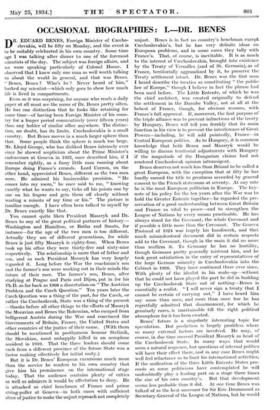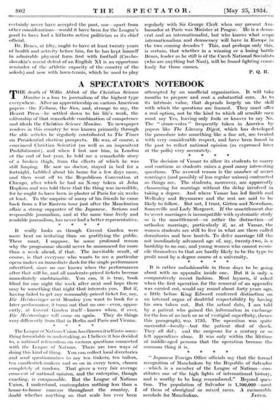OCCASIONAL BIOGRAPHIES : I.-DR. BENES
DR. EDUARD BENES, Foreign Minister of Czecho- slovakia, will be fifty on Monday, and the event is to be suitably celebrated in his own country. Some time ago I was talking after dinner to one of the foremost scientists of the day. The subject was foreign affairs, and we were speaking particularly of Colonel House. I observed that I knew only, one man as well worth talking to about the world in general, and that was Benes. "Benes, Benes ? Who's he ? Never heard of him," barked my scientist—which only goes to show how much life is lived in compartments. we were speaking particularly of Colonel House. I observed that I knew only, one man as well worth talking to about the world in general, and that was Benes. "Benes, Benes ? Who's he ? Never heard of him," barked my scientist—which only goes to show how much life is lived in compartments.
Even so it was surprising, for anyone who reads a daily paper at all must see the name of Dr. Benes pretty often. He has one distinction that he looks like retaining for some time—of having been Foreign Minister of his coun- try for a longer period consecutively (over fifteen years) than any holder of similar office anywhere. The distinc- tion, no doubt, has its limits. Czechoslovakia is a small country. But Benes moves in a much larger sphere than that. Some people think the sphere is much too large. Mr. Lloyd George, who has disliked Benes intensely ever since he showed scepticism about the Prime Minister's endeavours at Geneva in 1922, once described him, if I remember rightly, as a fussy little man running about Europe doing France's errands. Lord Curzon, on the other hand, appreciated Benes, different as the two men were. He admired his businesslike precision. " He comes into my room," he once said to me, " knowing exactly what he wants to say, ticks off his points one by one on his fingers and gets them off clearly without wasting a minute of my time or his." The picture is familiar enough. I have often been talked to myself by Dr. Benes exactly like that.
You cannot quite liken President Masaryk and Dr. Benes to any of the great political partners of history— Washington and Hamilton, or Botha and Smuts, for instance—for the age of the two' men is too different. Actually they are of different generations, for while Benes is just fifty Masaryk is eighty-four. When Benes took up his office they were thirty-five and sixty-nine respectively. The relationship is more that of father and son, and as such President Masaryk has very largely. regarded it Long before the %%Tar the coachman's son and the farmer's son were working out in their minds the future of their race. The farmer's son, Benes, after studying at Prague and Paris and Dijon, put in for his Ph.D. as far back as 1908 a dissertation on " The Austrian Problem and the Czech Question." Ten years later the Czech Question was a thing of the past, for the Czech, or rather the Czechoslovak, State was a thing of the present —thanks before all other things to the efforts of Masaryk the Moravian and Benes the Bohemian, who escaped from belligerent Austria during the War and convinced the Governments of Britain, France, the United States and other .countries of the justice of their cause. (With them should be mentioned in posthumous honour Stefanik, the Slovakian, most unhappily killed in an aeroplane accident in 1919. That the three leaders should come each from a different province of the future State was a factor making effectively for initial unity.) But it is Dr. Benes' European excursions much more than the service he renders to his own country that give him his prominence on the international stage today. That the audience contains plenty of critics as well as admirers it would be affectation to deny. He is attacked as chief henchman of France and prime string-puller at Geneva—in both cases with sufficient show of justice to make the unjust reproach not completely unjust. Benes is in fact no country's henchman except Czechoslovakia's, but lie has very definite ideas on European problems, and in some cases they tally with France's. That, of course, is inevitable. It is as much to the interest of Czechoslovakia, brought into existence by the Treaty of Versailles (and of St. Germain), as of France, territorially aggrandized by it, to preserve the Treaty settlement intact. Dr. Benes was the first man I heard describe the treaties as constituting " the public law of Europe," though I believe in fact the phrase had been used before. The Little Entente, of which he was the chief architect, was created originally to defend the settlement in the Danube Valley, not at all at the behest of France, though, for obvious reasons, with France's full approval. If, moreover, the first purpose of the triple alliance was to prevent infractions of the treaty by Hungary, Benes will tell you frankly that its main function in his view is to prevent the interference of Great Powers—including, he will add pointedly, France—in Central European politics. As to Hungary, it is common knowledge that both Benes and Masaryk would be willing to discuss territorial adjustments with Hungary if the magnitude of the Hungarian claims' had not rendered Czechoslovak opinion intransigent.
Benes deserves not much less than Briand to be called a great European, with the exception that at fifty he has hardly earned the title to greatness accorded by general consent to the French statesman at seventy. At any rate he is-the most European politician in Europe. The key- note of his policy for the ten years after the War was to hold the Greater Entente together—he regarded the pre- servation of a good understanding between Great Britain and France as vital to peace—and to strengthen the League of Nations by every means practicable. He has always stood for the Covenant', the whole Covenant and if possible a little more than the Covenant. The Geneva Protocol of 1924 was largely his handiwork, and that much misunderstood document did in certain respects add to the Covenant, though in the main it did no more than reaffirm it. To Germany he has no hostility, though Germans pretty generally "mistrust him, and he took great satisfaction in the entry of representatives of the large German minority in Czechoslovakia into the Cabinet in 1926. They have continued there ever since. With plenty of the idealist in his make-up—without that he could not have played the part he did in building up the Czechoslovak State out of nothing—Benes is essentially a realist. " I will never sign a treaty that I cannot be certain of carrying out," I have heard him say more than once, and more than' once too he has regretfully admitted that disarmament, for which he genuinely cares, is unattainable till the right political atmosphere for it has been created.
Benes' future is a singularly interesting topic for speculation. But prediction is largely profitless where so many external factors are involved. He may, of course, in due time succeed President Masaryk as head of the Czechoslovak State. In many ways that would seem a natural sequence, but questions of internal politics will have their effect there, and in any case Benes might well feel reluctance so to limit his international activities. If the unification of the three Little Entente States pro- ceeds as some politicians have contemplated he will undoubtedly play a leading part on a stage three times the size of his own country's. But that development seems less probable than it did. At one time Benes was talked of as the best successor for Sir Eric Drummond as Secretary-General of the League of Nations, but he would certainly never have accepted the post, nor—apart from other considerations—would it have been for the League's good to have had a hitherto active politician as its chief official.
Dr. Benes, at fifty, ought to have at least twenty years of health and activity before him; for he has kept himself in admirable physical form first with football (Czecho- slovakia's recent defeat of an English XI is an opportune reminder of the athletic capacity of the country of the sokols) and now with lawn-tennis, which he used to play regularly with Sir George Clerk when our present Am- bassador at Paris was Minister at Prague. He is a demo- crat and an internationalist, but who knows what scope internationalism and democracy will have in Europe in the two coming decades ? -This, and perhaps only this, • is certain, that whether in a winning or a losing battle ' Benes, leader as he still is of the Czech National Socialists (who are anything but Nazi), will be found fighting cease- lessly for those causes.
-P. Q. R.

















































 Previous page
Previous page